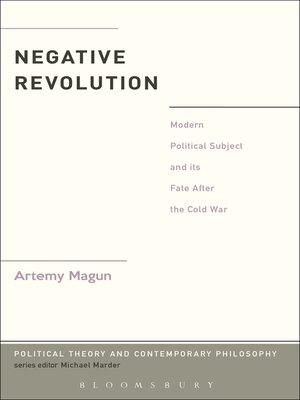Negative Revolution
ebook ∣ Modern Political Subject and its Fate After the Cold War · Political Theory and Contemporary Philosophy
By Artemy Magun

Sign up to save your library
With an OverDrive account, you can save your favorite libraries for at-a-glance information about availability. Find out more about OverDrive accounts.
Find this title in Libby, the library reading app by OverDrive.



Search for a digital library with this title
Title found at these libraries:
| Library Name | Distance |
|---|---|
| Loading... |
This thought-provoking work analyzes concrete political events and reinterprets key concepts in modern political science. Building on the works of Kant, Badiou, Adorno, Hegel, and more, it posits that the dynamics of revolution can be encapsulated in the concept of negation, since a revolution essentially negates "what is" by rejecting the power in place.
The work argues that revolution is the true ground of Western democracy and that the proof of a true democracy is the activity of protest movements. It discusses how modern philosophy conceives political truth as revolutionary or eventful, and that one aspect of revolution is negativity, which fluctuates between inertia and melancholia. It examines the problem of revolution in the context of modern philosophy, providing a diagnosis of the historical developments since the fall of the Soviet Union to the Arab Spring, setting forth an original theory of revolution while shedding light on the notion of negativity in contemporary thought. This innovative work will appeal to anyone interested in political theory and political philosophy.
The work argues that revolution is the true ground of Western democracy and that the proof of a true democracy is the activity of protest movements. It discusses how modern philosophy conceives political truth as revolutionary or eventful, and that one aspect of revolution is negativity, which fluctuates between inertia and melancholia. It examines the problem of revolution in the context of modern philosophy, providing a diagnosis of the historical developments since the fall of the Soviet Union to the Arab Spring, setting forth an original theory of revolution while shedding light on the notion of negativity in contemporary thought. This innovative work will appeal to anyone interested in political theory and political philosophy.







